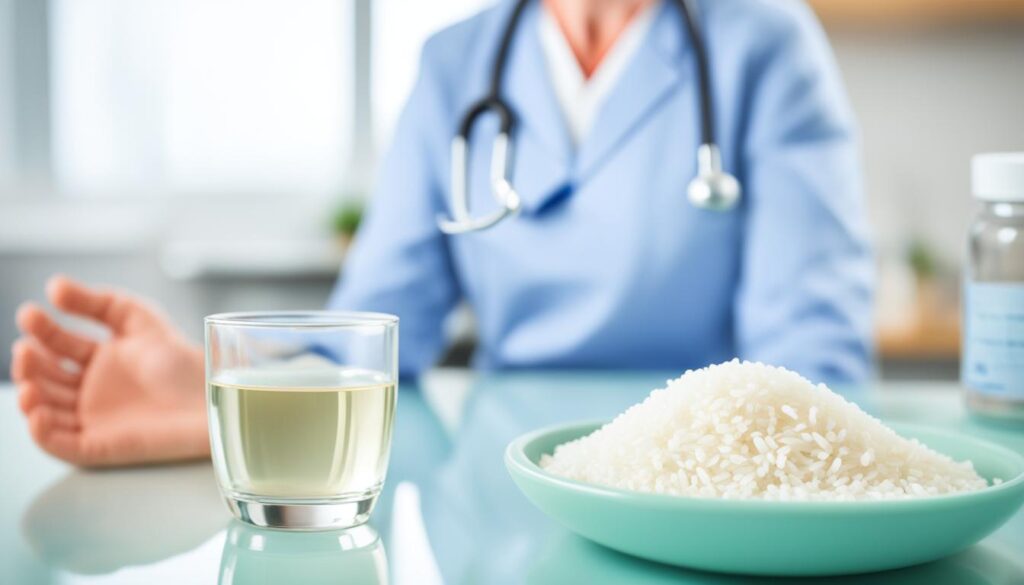Welcome to our article on acute gastroenteritis abdominal pain relief tips. Acute gastroenteritis, also known as the stomach flu, can cause abdominal pain and discomfort. While there is no specific medical treatment for viral gastroenteritis, there are several self-care measures you can take to find relief.
Table of Contents
ToggleIt’s important to stay hydrated and try to let your stomach settle by avoiding solid foods for a few hours. Sipping on ice chips or water, drinking clear soda or broths, and using oral rehydration solutions can help prevent dehydration. Resting and avoiding certain foods and substances can also aid in recovery.
Additionally, anti-diarrhea medications like loperamide or bismuth subsalicylate may be beneficial for some adults. For infants and children, rehydration is vital, and the introduction of normal diet should be done once they are rehydrated. It’s important to consult with a doctor for proper diagnosis and treatment.
Diagnosis of Acute Gastroenteritis
Diagnosing acute gastroenteritis, commonly known as the stomach flu, typically involves evaluating symptoms, conducting a physical exam, and considering similar cases in the community. While there are no quick tests available for most viruses causing gastroenteritis, a rapid stool test can detect the presence of rotavirus or norovirus. However, in certain situations, a doctor may require a stool sample to rule out bacterial or parasitic infections, as antibiotics or specific treatments may be necessary in such cases.
During the diagnosis process, the healthcare professional will inquire about your symptoms, assess your physical condition, and possibly request additional tests, such as a stool examination. These tests help determine the underlying cause and guide appropriate treatment.
Common Diagnostic Methods
1. Symptom evaluation: Your doctor will discuss your symptoms, including the duration, severity, and frequency of diarrhea, vomiting, abdominal pain, and any additional symptoms you may be experiencing.
2. Physical examination: The doctor will perform a physical examination, checking your vital signs and observing any signs of dehydration or other complications. They may also examine your abdomen for tenderness or swelling.
3. Stool sample analysis: In some cases, the doctor may request a stool sample to be tested for the presence of bacteria or parasites. This helps exclude bacterial or parasitic infections, as they require specific treatments such as antibiotics or antiparasitic medications.
To further illustrate the diagnostic methods, below is a table summarizing the different approaches:
| Diagnostic Method | Description |
|---|---|
| Symptom evaluation | Evaluation of the duration, severity, and frequency of gastrointestinal symptoms. |
| Physical examination | Assessment of vital signs, abdominal tenderness, and signs of dehydration. |
| Stool sample analysis | Testing of a stool sample to detect the presence of bacteria or parasites, ruling out bacterial or parasitic infections. |
Note: The specific diagnostic methods used may vary depending on the healthcare provider and the individual’s condition.
By conducting a thorough diagnosis, healthcare professionals can accurately identify the cause of acute gastroenteritis, ensuring appropriate treatment and management approaches are implemented to help promote recovery.
Treatment for Acute Gastroenteritis
Most cases of viral gastroenteritis do not require specific medical treatment. Antibiotics are ineffective against viruses, so the primary focus is on self-care measures. Staying hydrated is crucial, and it is recommended to drink plenty of fluids, taking small sips frequently. Oral rehydration solutions can be beneficial, especially for infants and children.
It’s important to let your stomach settle by avoiding solid foods for a few hours and then gradually easing back into eating. Anti-diarrhea medications like loperamide or bismuth subsalicylate may be used by adults but should be avoided if there are signs of another condition such as bloody diarrhea or fever.
| Treatment | Benefits |
|---|---|
| Hydration | Prevents dehydration |
| Oral rehydration solutions | Restores electrolyte balance |
| Avoiding solid foods | Allows the stomach to settle |
| Gradual reintroduction of foods | Ensures easy digestion |
| Anti-diarrhea medications | Relieves diarrhea symptoms in adults |
Remember, self-care measures and hydration are key components in managing viral gastroenteritis. By following these tips, you can help alleviate symptoms and contribute to a faster recovery.

Treatment for Infants and Children with Gastroenteritis
When it comes to treating gastroenteritis in infants and children, the main focus is on replenishing lost fluids and salts. Oral rehydration solutions are highly effective in rehydrating the child and are readily available without a prescription. Ensure that your child avoids plain water and apple juice, as these can worsen diarrhea. Instead, opt for rehydration solutions specifically formulated to replace the essential electrolytes and fluids lost during the illness.
Once your child is adequately rehydrated, you can gradually reintroduce their normal diet to help restore their strength. Include gentle, easy-to-digest foods such as toast, yogurt, fruits, and vegetables in their meals. However, it’s essential to avoid sugary foods as they can exacerbate symptoms and hinder recovery.
To aid in their recovery, make sure your child gets plenty of rest. Gastroenteritis can leave them feeling weak and tired, so ample rest will help their body heal more effectively.
Please note that store-bought anti-diarrheal medications should not be given to infants and children without the guidance of a healthcare professional. It’s crucial to consult a doctor before administering any such medication to ensure appropriate treatment and avoid potential complications.
Here is a table summarizing the recommended treatment approach for infants and children with gastroenteritis:
| Treatment | Details |
|---|---|
| Fluid Replacement | Use oral rehydration solutions to rehydrate the child and avoid plain water and apple juice. |
| Diet | Gradually reintroduce normal foods like toast, yogurt, fruits, and vegetables while avoiding sugary foods. |
| Rest | Ensure the child gets plenty of rest to aid in recovery. |
| Avoid Anti-Diarrheal Medications | Consult a doctor before giving any over-the-counter anti-diarrheal medications. |

By following these treatment guidelines, you can help your child recover from gastroenteritis more comfortably and manage the symptoms effectively. However, if your child’s condition worsens or does not improve despite these measures, it’s essential to consult a healthcare professional for further evaluation and guidance.
Preparing for a Doctor’s Appointment for Gastroenteritis
If necessary, you may need to see a doctor for gastroenteritis. To make the most of your appointment, it’s helpful to prepare a list of questions. Some questions you may want to ask include:
- What could be the likely cause of my symptoms?
- Do I need to undergo any tests for diagnosis?
- What is the best treatment approach for my condition?
- Are there any alternative treatments I should consider?
- Are there any at-home remedies that can help ease my symptoms?
During the appointment, the doctor may inquire about the timing and severity of your symptoms, as well as factors that improve or worsen them. They may also ask if you have had any contact with others experiencing similar symptoms. Depending on the severity of your condition, the doctor may refer you to a specialist for further evaluation or treatment.
Remember to bring any relevant medical records, such as previous test results or treatment history, to your appointment.
Sample Questions to Ask Your Doctor:
| Question | Why Ask |
|---|---|
| What could be causing my symptoms? | Understanding the underlying cause can help guide treatment decisions. |
| What tests do I need to undergo for a proper diagnosis? | Tests can help identify the specific cause of gastroenteritis and determine the most appropriate treatment approach. |
| What is the recommended treatment for my condition? | Knowing the treatment options can help you make informed decisions about your healthcare. |
| Are there any alternative treatments I should consider? | Exploring alternative treatments can provide additional options for managing gastroenteritis. |
| Are there any at-home remedies that can help alleviate my symptoms? | Discovering effective at-home remedies can complement medical treatment and provide relief. |

Remember, your doctor is there to help you. Asking questions and seeking clarity ensures that you receive the best possible care and understanding of your condition.
Managing Acute Gastroenteritis at Home
If you’re experiencing acute gastroenteritis, there are several home remedies you can try to manage your symptoms and aid in your recovery. Here are some self-care measures that can help:
Rest
Resting is crucial to allow your body to recover from gastroenteritis. Take it easy and give yourself permission to rest and relax as much as possible. This will help conserve your energy and allow your immune system to fight off the infection.
Hydration
Staying hydrated is essential when you have gastroenteritis, as vomiting and diarrhea can lead to dehydration. Drink plenty of fluids, such as water, soup, diluted fruit juice, or oral rehydration solutions. These solutions contain the right balance of electrolytes and sugars to help replace the fluids and minerals your body has lost.

Plain Foods
While your stomach is recovering, it’s best to stick to bland, easy-to-digest foods. Soda crackers, soup, oats, noodles, bananas, and rice are good options to consider. These foods are gentle on your stomach and can provide some nourishment without further irritating your digestive system.
Medications
Some adults may find relief from over-the-counter anti-diarrhea medications like loperamide or bismuth subsalicylate. These medications can help reduce the frequency of diarrhea and ease any associated discomfort. However, it’s important to note that these medications are not suitable for everyone, so consult with a healthcare professional before taking them.
Ginger
Ginger has been used as a natural remedy for various digestive issues, including gastroenteritis. It has anti-inflammatory and antibacterial properties that can help soothe the stomach and alleviate symptoms like vomiting and nausea. You can add fresh ginger to hot water to make ginger tea or include it in your meals for added flavor and potential relief.
Remember, while these home remedies can help manage your symptoms, it’s still important to consult with a doctor if your condition worsens or persists. They can provide a proper diagnosis and recommend any necessary treatments or additional measures to ensure your recovery.
Preventing Viral Gastroenteritis
To prevent viral gastroenteritis, it’s important to practice good hygiene. Follow these measures to reduce the risk of infection:
- Regular Handwashing: Thoroughly wash your hands with soap and water for at least 20 seconds, especially after using the bathroom, changing diapers, and before and after handling food.
- Food Hygiene: Maintain proper food hygiene by thoroughly washing fruits and vegetables, cooking food thoroughly, and avoiding cross-contamination between raw and cooked foods.
- Avoid Contact with Infected Individuals: Steer clear of direct contact with individuals who have viral gastroenteritis, as it can be highly contagious. Avoid sharing towels, bedding, and toiletries with infected individuals to prevent the spread of the virus.
- Rotavirus Vaccines: Vaccination is an effective preventive measure against gastroenteritis caused by rotavirus. Rotavirus vaccines are available and are usually administered orally to infants in multiple doses.
In addition to these preventive measures, it’s essential to clean surfaces that may have come into contact with infected stool or vomit using a bleach solution. Wash clothes and linens that may have been contaminated as well. Remember, the flu vaccine does not protect against gastroenteritis, so it’s important to focus on practicing proper hygiene and considering rotavirus vaccines for prevention.

| Preventive Measures | Description |
|---|---|
| Regular Handwashing | Thoroughly wash hands with soap and water for at least 20 seconds. |
| Food Hygiene | Wash fruits and vegetables, cook food thoroughly, and avoid cross-contamination. |
| Avoid Contact with Infected Individuals | Avoid direct contact and sharing of towels, bedding, and toiletries with infected individuals. |
| Rotavirus Vaccines | Consider rotavirus vaccination, especially for infants. |
Outlook and Complications
When it comes to gastroenteritis, the outlook is generally positive. Symptoms often resolve within a week, sometimes even sooner. In most cases, medical treatment is not necessary, and self-care measures are sufficient to manage the condition. However, it’s important to be aware that severe cases can occur, particularly in older adults and individuals with weakened immune systems.
For viral gastroenteritis, the most common form of the condition, the outlook is typically excellent. The body’s immune system is usually able to fight off the virus, resulting in a full recovery. It’s important to remember that antibiotics are ineffective against viruses, so the focus is on supportive care.
Bacterial gastroenteritis, on the other hand, can be effectively treated with prompt and appropriate antibiotic therapy. This often leads to a good prognosis, with symptoms improving within a few days.
Complications of Gastroenteritis
While complications are rare, they can occur in certain cases of gastroenteritis. Severe dehydration is one of the main concerns, especially if there is prolonged vomiting and diarrhea. Dehydration can lead to electrolyte imbalances and may require medical intervention.
In some instances, gastroenteritis can also make individuals more susceptible to other infections. Weakened immune systems can leave the body vulnerable to opportunistic pathogens. If symptoms worsen or fail to improve after a few days, it’s important to seek medical attention to rule out any underlying complications.
To summarize, the outlook for viral gastroenteritis is generally excellent, with symptoms resolving within a week. Most cases can be managed through self-care measures, but severe cases and bacterial gastroenteritis may require medical treatment. While complications are uncommon, dehydration and secondary infections can occur in certain situations. If symptoms persist or worsen, it’s important to consult with a healthcare professional for appropriate evaluation and care.
Conclusion
Acute gastroenteritis can cause abdominal pain and discomfort, but there are several self-care measures and home remedies that can help provide relief. Staying hydrated by drinking plenty of fluids, resting, and avoiding certain foods can help manage symptoms. Over-the-counter medications like anti-diarrhea medications can also be beneficial for adults.
However, it’s important to consult with a doctor, especially for infants, children, and individuals with severe symptoms or underlying medical conditions. They can provide a proper diagnosis and recommend the appropriate treatment plan. For infants and children, rehydration is crucial, and the normal diet should be reintroduced once they are rehydrated.
Preventive measures can also be taken to reduce the risk of viral gastroenteritis. Practicing good hand hygiene, such as regular handwashing with soap and water, and following proper food safety practices can help prevent the spread of the virus.
In most cases, the outlook for gastroenteritis is positive, with symptoms typically resolving within a week. However, it is important to seek medical attention if symptoms worsen or do not improve after a few days. With the right self-care measures and medical guidance, you can effectively manage gastroenteritis and recover quickly.
FAQ
What is acute gastroenteritis and how does it cause abdominal pain?
Acute gastroenteritis, also known as the stomach flu, is an infection that leads to inflammation of the stomach and intestines. This can cause abdominal pain and discomfort.
Is there a medical treatment for viral gastroenteritis?
There is no specific medical treatment for viral gastroenteritis. However, there are several self-care measures that can provide relief.
How can I find relief from acute gastroenteritis symptoms?
To find relief from acute gastroenteritis symptoms, it is important to stay hydrated and let your stomach settle by avoiding solid foods for a few hours. Sipping on ice chips or water, drinking clear soda or broths, and using oral rehydration solutions can help prevent dehydration. Resting and avoiding certain foods and substances can also aid in recovery.
Can I take anti-diarrhea medications for acute gastroenteritis?
Anti-diarrhea medications like loperamide or bismuth subsalicylate may be beneficial for some adults. However, they should be avoided if there are signs of another condition such as bloody diarrhea or fever.
How should infants and children with gastroenteritis be treated?
The primary goal for infants and children with gastroenteritis is to replace lost fluids and salts. Oral rehydration solutions can be given to rehydrate the child. Once the child is rehydrated, they can start reintroducing their normal diet. Sugary foods should be avoided, and plenty of rest should be provided.
What should I discuss with my doctor during an appointment for gastroenteritis?
During a doctor’s appointment for gastroenteritis, it is helpful to ask about the likely cause of your symptoms, the need for tests, the best treatment approach, possible alternatives, and any at-home remedies to ease the symptoms. Your doctor may also ask about the timing and severity of symptoms and possible contacts with others experiencing similar symptoms.
Are there any home remedies for managing acute gastroenteritis?
Yes, there are several home remedies that can help manage acute gastroenteritis. These include getting plenty of rest, staying hydrated, consuming bland and easy-to-digest foods, and using anti-diarrhea medications like loperamide or bismuth subsalicylate. Ginger has also been shown to reduce vomiting in gastroenteritis and can be added to drinks or food.
How can I prevent viral gastroenteritis?
To prevent viral gastroenteritis, it is important to practice good hygiene. Regular handwashing with soap and water, cleaning surfaces that may have come into contact with infected stool or vomit, and washing clothes and linens that may have been contaminated are recommended. Avoiding sharing towels, bedding, and toiletries with infected individuals can also help prevent the spread of the virus.
What is the outlook for viral gastroenteritis?
The outlook for viral gastroenteritis is typically excellent, with symptoms resolving within a week or even shorter duration. Most cases do not require medical treatment and can be managed with self-care measures. However, severe cases can occur in older adults and individuals with weakened immune systems. Complications, while uncommon, can include severe dehydration, electrolyte imbalances, and other infections.
About The Author

Medically reviewed by Dr. Nivedita Pandey, MD, DM (Gastroenterology)
Dr. Nivedita Pandey is a U.S.-trained gastroenterologist and hepatologist with extensive experience in diagnosing and treating liver diseases and gastrointestinal disorders. She specializes in liver enzyme abnormalities, fatty liver disease, hepatitis, cirrhosis, and digestive health.
All content is reviewed for medical accuracy and aligned with current clinical guidelines.





